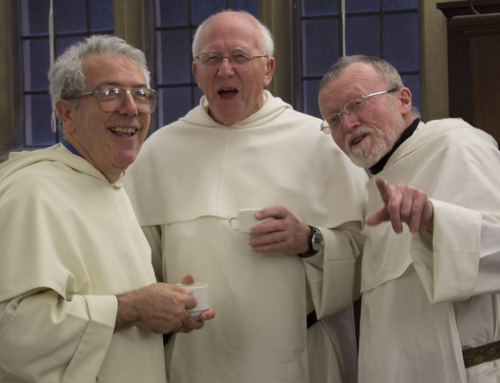Sed Contra: An Essay on the Modern Culture
A “sed contra” essay is to engage a cultural concern and to address it with the help of some philosophical or theological authority. A “sed contra” essay will be published once per month during the academic year.
In a society that is both increasingly polarized and secular, is friendship or friendliness even possible with our neighbors who vocally oppose the Church’s teachings? Has a set of alternatives been set up such that either (a) we set aside or trivialize the contentious parts of Catholic teaching in order to minimize discord or (b) we double down on these contentions in order to stay faithful to Church teaching? If it were put as a maxim, it might read: either exchange religion for irreligion to make an enemy a friend, or turn a friend into an enemy to convert irreligion to religion. Either we’re all basically in agreement with one another, or we’re all against each other; there’s no in-between.
But against this, I contest that we should heed the instruction of St. Paul:
For we are not contending against flesh and blood, but against the principalities, against the powers, against the world rulers of this present darkness, against the spiritual hosts of wickedness in the heavenly places (Eph 6:12).
Our enemies—our real enemies—are not fellow human beings. We are fighting for, not against our fellow man. Instead, our enemies are those spiritual hosts who set about tearing human beings away from God. There are certainly fellow human beings who starkly oppose Christ’s mission, whether that should involve persecuting Christians, impugning the Church’s moral authority, or grossly trivializing human life. With these, it would be fancifully unrealistic to strike up a friendship, but these are not the vast majority of people.
Justice Ruth Bader Ginsburg’s passing over a month ago prompted renewed attention to her friendship with fellow Justice Antonin Scalia. That they were such good friends was noteworthy because of how divergently they saw the world and how passionately they expressed their views. Scalia was a devout Catholic and a justice who believed that applying the original meaning of a statute’s text was the only reasonable way to go about his job; Ginsburg was a progressive who argued for a purposive interpretation of those same texts. Both justices passionately went after each other in their opinions, but despite this—and perhaps partly because of this—they maintained a warm friendship.
Human beings can and often do unite over a common pursuit of happiness, even if they disagree about what it is to be happy. If they do disagree, there can sometimes still be room for some shared virtues and delights. Ginsburg and Scalia bonded over opera and a love for the law—even though they disagreed about legal interpretation and once argued about the Second Amendment until 4am. Friendship in this life does not consist in the absence of big disagreements; rather, it consists in having something in common. We must, of course, be wary of shared pursuits that are sinful or harm charity in some way. We must also recognize that there are no substitutes for friends within the Church with whom we share bonds of faith and charity.
Yet the Church cannot carry out her evangelical mission unless Catholics have some footing with those who are outside of or estranged from the Church. Without a common language, trust, and understood good will with a Catholic, it is hard to imagine that someone outside the Church could believe the Word of God if it were proclaimed to him. As grace builds on nature, so do human connections built on some kind of trust make spreading the Gospel possible.
This means, then, that we’re forced to face the ugliness of sin and ignorance in people we care about. There are some pretty bad propositions promoted as orthodoxy. We can’t hide from them by pretending they aren’t that bad or by not caring about the people bewitched by these supposed orthodoxies. Moreover, with non-believers there will always be that tension that what is most fundamental and held most dearly in life isn’t shared by one’s friend (that is, without a conversion). That tension, while painful, is good because it both is sensitive to reality and recognizes the dignity of the friend. “In the world you have tribulation; but be of good cheer, I have overcome the world” (John 16:33).
Christ offers salvation to all who still walk on this earth. Let us never forget that we are contending for them and not directly against them.
✠
Photo by Fr. Lawrence Lew, O.P. (used with permission)







